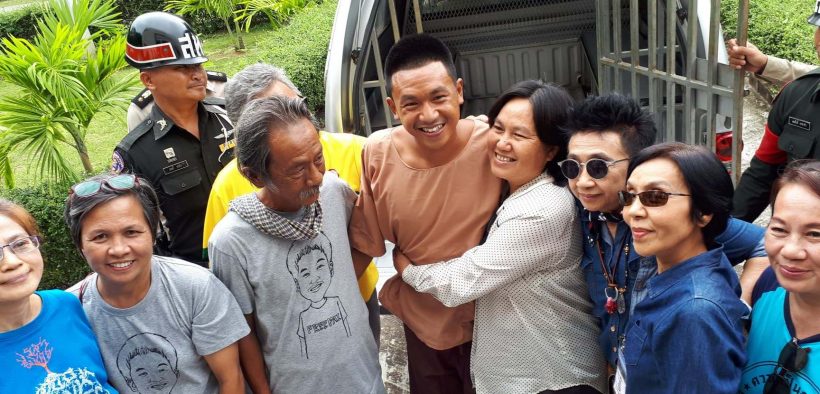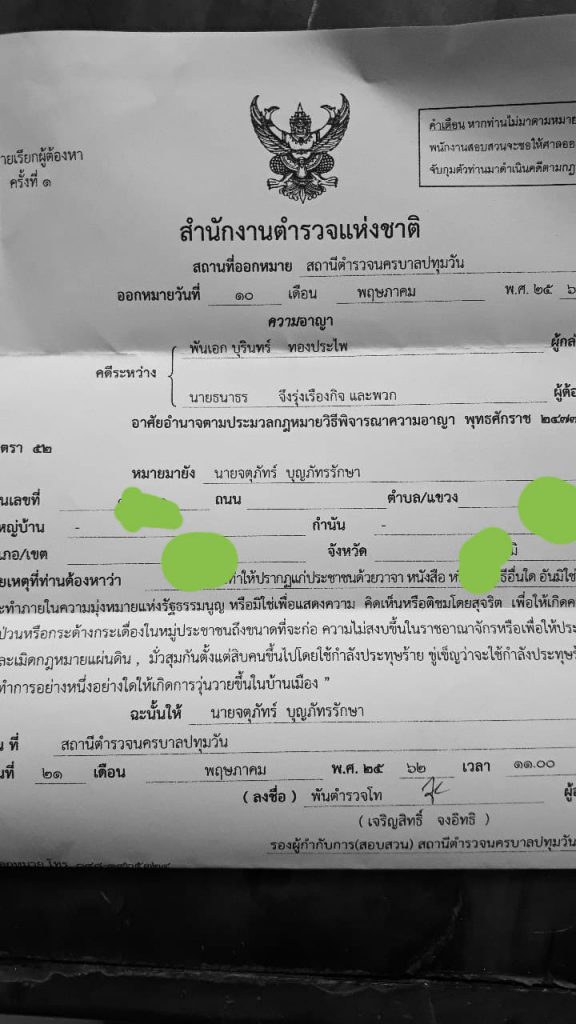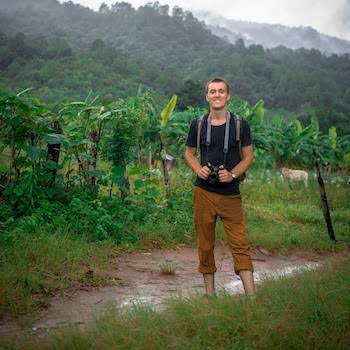Thai Student Freed After 29 Months in Prison for Facebook Post

“I have been in jail for so long that I have forgotten how freedom is.”
Jatupat “Pai” Boonpattararaksa looks out of a tall, barred window of a jail in the middle of Khon Kaen City, northeastern Thailand. The 27-year-old’s hair is buzzed and he’s dressed in a baggy, shapeless tan shirt. He looks down at the cards in his hand. The return addresses on the envelopes are far from Khon Kaen – France, England, Finland, the Netherlands – places that look nothing like the inside of a Thai jail.
“People in prison had a lot of questions: ‘How could this happen? Cards from so many places?” Pai said to Citizen Truth.
Pai is a recent graduate of Khon Kaen University, but it’s been over two years since his rocky graduation from their law program. He’s also a member of Dao Din, a pro-democracy student activist group in Thailand’s northeastern Isaan region. Dao Din works to call attention to social problems in rural Isaan – land rights, economic inequality – and ask what the causes and solutions might be.
Pai wasn’t in jail yet on December 1, 2016, when the new Thai monarch King Vajiralongkorn ascended the throne. The next day, Pai shared a short biography about the king from BBC’s Thai service on Facebook. The day after, the police arrested Pai for defaming the monarchy by sharing the article, an alleged violation of the country’s lèse majesté law and the Computer Crimes Act. Pai’s legal saga had begun.
Pai was initially released on bail after two days, but the decision to grant bail was reversed after a few weeks and he was detained again. After eight months of legal proceedings and closed-door trials, Pai pled guilty and was convicted in August 2017. His case became a symbol of the Thai military government’s crackdown on freedom of expression.
Shrinking Free Speech in Thailand
The space for free speech and expression in Thailand has been shrinking in recent years, according to human rights groups. Following a military coup in May 2014, a junta governed the country until elections were held in March of this year. The junta government banned gatherings of more than five people until a few months prior to the elections. Rights groups say sedition laws and the Computer Crimes Act have been used to limit free speech. Some claim the government has used these laws to target political opposition and activist groups.
“The country that doesn’t have democracy is really tough for people, especially new generations who want to live a life in their own style,” Pai told Citizen Truth. “There’s no freedom to do anything.”
The BBC Thai article that Pai posted about the King was shared over 2,800 times on Facebook before it was blocked in Thailand. Pai was arrested following a complaint by a military officer who already had a feud with Dao Din. Soon after the 2014 coup, the officer had posted on the group’s Facebook page: “This is a battle, my little friends. You have two ways to go…One: fight, be broken into pieces, and destroyed. Two: since you know that we can take a friend of yours hostage, if I were you, I would stop [your political activities] and negotiate.”
Dao Din didn’t stop their activities.
For two years, civil society groups around the world and organizations across Thailand campaigned for Pai’s release. He received letters from around the world as part of a campaign by Amnesty International and other groups.
“They really helped me to get through the time. It’s not that easy to get a letter into a Thai jail. They cheered me up,” Pai told Citizen Truth. “It proves that the world is still a place to be grateful for.”
Pai is Released, But Thai Military Still Reigns
After over 800 days in prison, Pai learned he would soon be released, but not as a result of his supporters’ campaigns. Before King Vajiralongkorn’s recent coronation ceremony, the monarch pardoned over 50,000 prisoners across the country.
“The general pardon, issued on May 3rd, said that whoever is serving a penalty with less than a year left shall be released,” said Yingcheep Atchanont, program manager at the Internet Law Reform Dialogue (iLaw), a Thai nonprofit.
Pai’s sentence would be up later in 2019 and he was included in the pardon.
“He was treated as the other prisoners, nothing special,” said Yingcheep. “The release, therefore, means nothing to the political situation.”
On May 10, Pai walked out of jail in Khon Kaen and into the arms of family and friends with flowers, and a few journalists.
“I have been in jail for so long that I have forgotten how freedom is,” Pai told Citizen Truth.
Pai was in prison for Thailand’s elections in March, its first in eight years. But many of Pai’s fellow pro-democracy advocates were dubious that the elections stood any chance of bringing real change. Election monitors claim the campaign period and regulations were “heavily tilted” to benefit the political party created by the outgoing junta. The Constitutional Court dissolved one opposition party, Thai Rhaksa Chart, after they attempted to nominate Thailand’s Princess Ubolratana as their candidate for prime minister.
It’s still not clear who came out on top in the elections, as parties jockey to form coalitions, but the military will retain much of its power regardless. The military still holds the power to appoint all 250 members in the Senate and has passed legislation to make it so future governments are legally obligated to carry out some of the junta’s plans. Former army chief Prayuth Chan-ocha is poised to remain prime minister.
“The election doesn’t really prove that Thailand has a democracy right now. There still isn’t really democracy until there is a constitution from the Thai people,” Pai remarked to Citizen Truth.
Pai and Fellow Activists Continue to Face Peril
While Pai may have been freed, his fellow activists continue to face risks, and Pai isn’t free of the penal system.
Days after his release, Pai received a summons to testify at a Bangkok court in a sedition case against the leader of the Future Forward opposition political party, Thanathorn Juangroongruangkit. The case alleges that Thanathorn helped Pai and others flee an anti-coup rally in 2015. Pai and others face charges in this case as well, but their case has been inactive for years.

Pai’s summons to appear in a Bangkok court. (Photo: Jatupat “Pai” Boonpattararaksa)
Thanathorn says the case is one of seven charges against him, one of which is under the Computer Crimes Act, in addition to five complaints through the Election Commission. Thanathorn has said he believes the sedition charges are politically motivated.
“Why does this come a week after the election?” he said.
Thanathorn also recently stated at an event in Bangkok that representatives of a pro-military party had called his mother, offering to have all the charges against him dropped if Future Forward would relinquish 20 seats in the parliament.
“The law and politics are the same thing in Thailand,” Pai said.
More Charges Because of Activism
Pai has also faced charges in five separate cases related to his activism: one case for violating the junta’s ban on political assemblies, for distributing fliers in opposition to a constitutional referendum. If Pai had been found guilty on all charges against him, he could face up to 40 years in prison. Some charges remain outstanding.
Since Pai was released, he has been reunited with his fellow Dao Din members and spent time with friends and family. He doesn’t pretend the last 29 months were easy, and he has no illusions that his release signals a change in the country’s politics around freedom of expression and speech.
Thailand’s outgoing military government recently appointed the 250 senators who will serve for the next five years. One-third of them have backgrounds in the military or police force.
“I don’t expect democracy in Thailand soon. But I expect Thai people to learn about their history, their government, and their politics,” said Pai.















